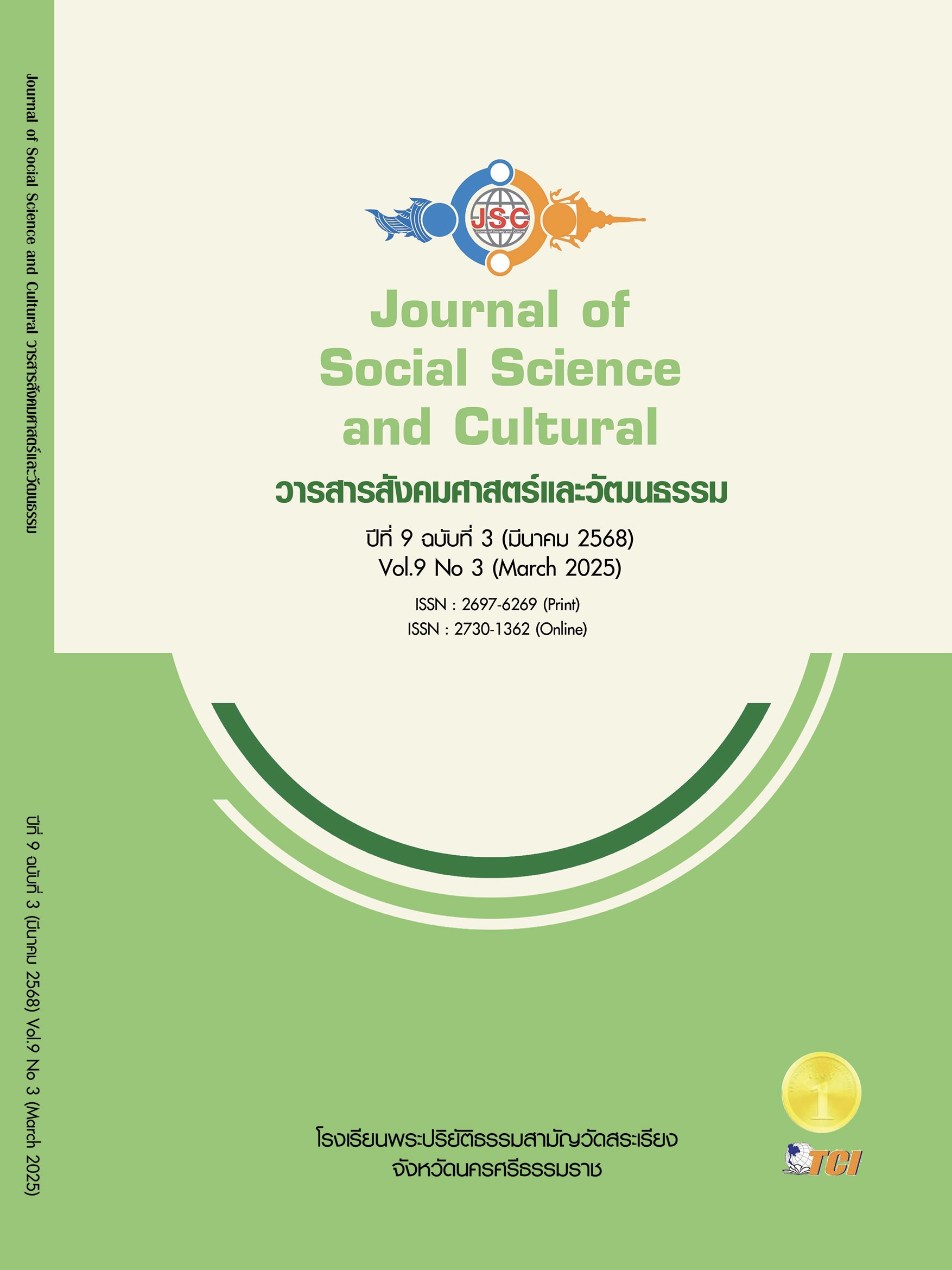LEGAL PROBLEMS ON THE COLLECTION OF SCIENTIFIC EVIDENCE FOR CRIMINAL PROCEEDINGS AT THE LEVEL OF INQUIRY OFFICER
Main Article Content
Abstract
This research article aims to examine the legal issues surrounding the collection of scientific evidence in criminal cases, particularly at the investigation stage. It explores relevant concepts, theories, and criteria for collecting scientific evidence under both Thai and foreign laws, along with an analysis and recommendations for legal improvements to enhance appropriateness. This research is a qualitative research using the method of document analysis as the main method, which compares the principles of international law and the principles of law currently applicable, academic articles, theses, dissertations, various law journals, and related judgments to obtain conclusions and recommendations for the enforcement of laws in Thailand. The study found that scientific evidence plays a crucial role in determining the guilt or innocence of suspects in complex cases, adhering to the principles of human dignity and fair trial procedures. However, issues arise in the evidence collection process during the investigation stage, as there is a lack of clear procedures and classification of biological sample types. Additionally, current laws impose adverse presumptions against suspects only in cases carrying a prison sentence of more than three years, leading to inequalities in legal enforcement. A comparative analysis of foreign legal systems indicates that all countries prioritize human dignity within their justice systems, but differences exist in evidence-collection methods. Therefore, legal reforms should establish clear procedures for evidence collection, classify evidence into internal and external body samples based on international standards, and appropriately adjust the scope of criminal offenses requiring scientific evidence. Moreover, adverse legal presumptions against individuals should be abolished to ensure fairness in the judicial process.
Article Details
References
จิราภรณ์ ศรีแจ่ม. (2567). คดี “ป้าบัวผัน” สะท้อนปัญหางานสอบสวนตำรวจไทยและทัศนคติ “เป็นลูกตำรวจทำอะไรก็ไม่ผิด” หรือไม่. เรียกใช้เมื่อ 29 สิงหาคม 2567 จาก https://www.bbc.com/thai/articles/c9e2zl5534no
บรรเจิด สิงคะเนติ. (2558). หลักพื้นฐานของสิทธิและเสรีภาพและศักดิ์ศรีความเป็นมนุษย์. กรุงเทพมหานคร: วิญญูชน.
ภาณุพล บุรพันธ์ และอัจฉรียา ชูตินันทน์. (2557). การคุ้มครองเด็กและผู้หญิงจากการตรวจพิสูจน์บุคคลโดยวิธีการทางวิทยาศาสตร์ ตามมาตรา 131/1 แห่งประมวลกฎหมายวิธีพิจารณาความอาญา. ใน วิทยานิพนธ์นิติศาสตรมหาบัณฑิต สาขานิติศาสตร์. มหาวิทยาลัยธุรกิจบัณฑิตย์.
ภาณุมาตร์ ขำคล้าย. (2565). ปัญหากฎหมายเกี่ยวกับการนำเอาข้อมูลสารพันธุกรรมไปใช้ในคดีอื่น. ใน วิทยานิพนธ์นิติศาสตรมหาบัณฑิต สาขานิติศาสตร์. มหาวิทยาลัยธุรกิจบัณฑิตย์.
ศรันยา สีมา. (2564). การสอบสวนในคดีอาญา. เรียกใช้เมื่อ 14 กุมภาพันธ์ 2567 จาก https://library.parliament.go.th/th/radioscript-rr2564-jan2
สหรัฐ กิติ ศุภการ. (2563). กฎหมายวิธีพิจารณาความอาญา. (พิมพ์ครั้งที่ 11). กรุงเทพมหานคร: อมรินทร์พริ้นติ้งแอด์พับลิชชิ่ง จำกัด มหาชน.
สำนักกฎหมาย woody law. (2562). Crime Control and Due Process. เรียกใช้เมื่อ 20 ตุลาคม 2566 จาก https://shorturl.asia/0WrNG
สำนักงานศาลรัฐธรรมนูญ. (2563). รวมคำวินิจฉัยศาลรัฐธรรมนูญ ประจำปี 2562 เล่ม 1. กรุงเทพมหานคร: พี.เพรส จำกัด.
อรรถพล แซ่มสุวรรณวงศ์. (2554). นิติวิทยาศาสตร์ 4 เพื่อการสืบสวนสอบสวน. (พิมพ์ครั้งที่ 6). กรุงเทพมหานคร: ดาวฤกษ์ จำกัด.
เอกฤทธิ์ พิศนุภูมิ. (2555). การตรวจส่วนประกอบของร่างกายกับการประกันสิทธิและเสรีภาพของบุคคลใน คดีอาญาตามประมวลกฎหมายวิธีพิจารณาความอาญามาตรา 131/1. ใน วิทยานิพนธ์นิติศาสตรมหาบัณฑิต สาขานิติศาสตร์. มหาวิทยาลัยธรรมศาสตร์.
Isra news. (2566). 5 ปี คดี ‘บอส’ ข้อครหาดองเรื่อง-เลื่อนพบอัยการ 7 หน ก่อนอินเตอร์โพลแพร่ หมายจับทั่วโลก. เรียกใช้เมื่อ 25 ตุลาคม 2566 จาก https://shorturl.asia/DEc91
Thai PBS. (2565). ตร.แถลงปิดสำนวน “คดีแตงโม” 2,249 แผ่น ส่งฟ้อง 5 ผู้ต้องหา. เรียกใช้เมื่อ 29 สิงหาคม 2567 จาก https://www.thaipbs.or.th/news/content/314892


